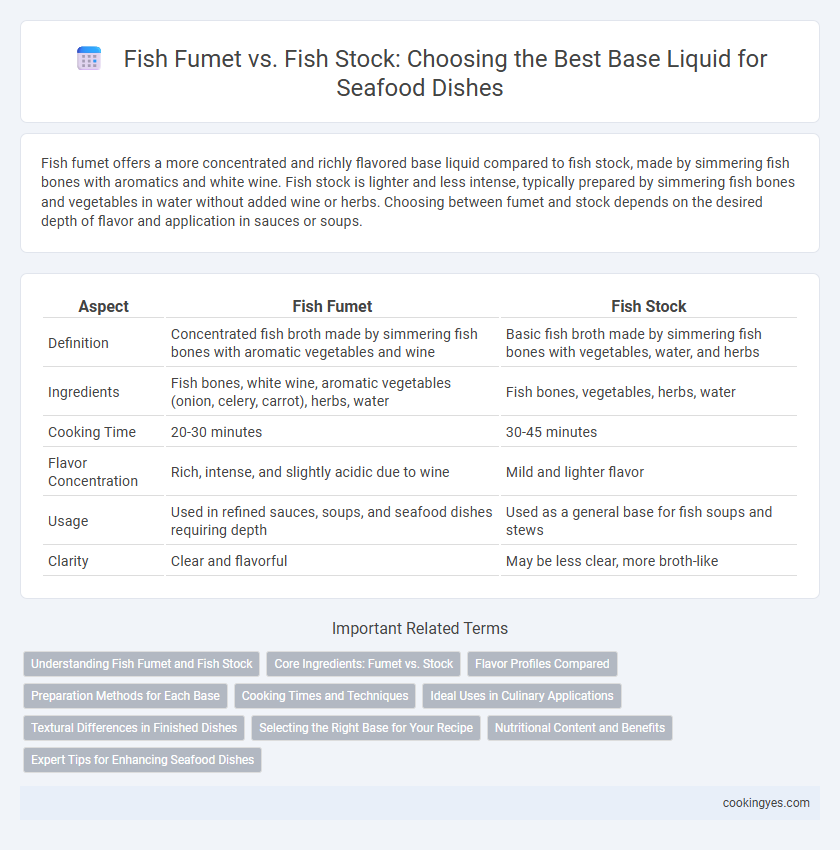Fish fumet offers a more concentrated and richly flavored base liquid compared to fish stock, made by simmering fish bones with aromatics and white wine. Fish stock is lighter and less intense, typically prepared by simmering fish bones and vegetables in water without added wine or herbs. Choosing between fumet and stock depends on the desired depth of flavor and application in sauces or soups.
Table of Comparison
| Aspect | Fish Fumet | Fish Stock |
|---|---|---|
| Definition | Concentrated fish broth made by simmering fish bones with aromatic vegetables and wine | Basic fish broth made by simmering fish bones with vegetables, water, and herbs |
| Ingredients | Fish bones, white wine, aromatic vegetables (onion, celery, carrot), herbs, water | Fish bones, vegetables, herbs, water |
| Cooking Time | 20-30 minutes | 30-45 minutes |
| Flavor Concentration | Rich, intense, and slightly acidic due to wine | Mild and lighter flavor |
| Usage | Used in refined sauces, soups, and seafood dishes requiring depth | Used as a general base for fish soups and stews |
| Clarity | Clear and flavorful | May be less clear, more broth-like |
Understanding Fish Fumet and Fish Stock
Fish fumet boasts a concentrated flavor profile created by simmering fish bones and aromatic vegetables with wine, making it ideal for refined sauces and delicate seafood dishes. Fish stock, by contrast, is a more straightforward broth made by boiling fish bones and vegetables in water, offering a lighter, more versatile base for soups and stews. Understanding the distinction between fish fumet and fish stock allows chefs to select the appropriate liquid for enhancing the depth and complexity of their culinary creations.
Core Ingredients: Fumet vs. Stock
Fish fumet is a concentrated liquid made by simmering fish bones, heads, and aromatic vegetables with white wine and herbs, resulting in a rich and intense flavor ideal for delicate seafood sauces. Fish stock is prepared by gently simmering fish bones and vegetables without wine, producing a lighter, less concentrated base suitable for soups and broths. Key differences lie in the use of wine in fumet and the intensity of flavor, making fumet a more refined and flavorful foundation for complex dishes.
Flavor Profiles Compared
Fish fumet offers a more concentrated and intense flavor profile compared to fish stock, as it is made by gently simmering fish bones, heads, and aromatic vegetables with white wine and herbs. Fish stock provides a lighter, more delicate taste due to longer simmering times and a simpler ingredient list, making it versatile for subtle seafood dishes. The richer, wine-infused aroma of fumet enhances sauces and soups, while the mildness of stock serves as a neutral base for various preparations.
Preparation Methods for Each Base
Fish fumet is prepared by gently simmering fish bones, often with white wine, aromatic vegetables, and herbs, extracting a concentrated, flavorful essence. Fish stock involves boiling fish bones and trimmings with mirepoix and seasonings for a shorter time, resulting in a lighter, less intense liquid. The slower, lower-temperature cooking of fumet yields a richer base ideal for refined sauces, while stock suits soups and lighter dishes.
Cooking Times and Techniques
Fish fumet, a concentrated broth made by simmering fish bones and aromatics for 20-30 minutes, offers a rich, gelatinous base ideal for delicate sauces and soups. Fish stock requires a longer simmering time, typically 45 minutes to 1 hour, to extract deeper flavors without becoming bitter, making it suitable for heartier dishes. Precise temperature control and avoiding overcooking prevent cloudiness and off-flavors, ensuring a clear, flavorful base liquid.
Ideal Uses in Culinary Applications
Fish fumet offers a concentrated, rich flavor ideal for delicate dishes like seafood sauces and bisques, where a deep, refined taste is essential. Fish stock provides a lighter, more versatile base suitable for soups, stews, and poaching liquids that require subtle seafood notes. Choosing between fish fumet and fish stock depends on the intensity needed in the culinary application, with fumet preferred for bold flavor enhancement and stock for gentle background layers.
Textural Differences in Finished Dishes
Fish fumet and fish stock serve distinct roles in culinary applications due to their textural outcomes in finished dishes. Fish fumet, simmered with aromatic vegetables and white wine, typically yields a more concentrated, gelatinous liquid that enhances mouthfeel and richness in sauces and soups. In contrast, fish stock, prepared with fewer aromatics and shorter cooking times, results in a lighter, clearer texture better suited for delicate broths and subtle flavor profiles.
Selecting the Right Base for Your Recipe
Fish fumet offers a concentrated and rich flavor profile achieved by simmering fish bones with aromatic vegetables and white wine, making it ideal for delicate sauces and seafood dishes requiring depth. Fish stock provides a lighter, more versatile base created by gently simmering fish bones and mirepoix without wine, suitable for soups and broths where a subtle seafood essence is preferred. Selecting between fumet and fish stock depends on the desired intensity and complexity of flavor in your recipe, ensuring a balanced and complementary taste.
Nutritional Content and Benefits
Fish fumet offers a richer nutritional profile compared to fish stock, containing higher concentrations of minerals such as calcium, magnesium, and phosphorus derived from simmered fish bones and aromatic vegetables. Fish fumet is typically clarified, resulting in a cleaner taste and lower fat content, which makes it an excellent base for nutrient-dense soups and sauces. Fish stock, while milder and lighter, provides essential proteins and collagen but generally has fewer minerals and less depth in nutritional benefits.
Expert Tips for Enhancing Seafood Dishes
Fish fumet offers a more concentrated and refined flavor compared to fish stock, making it ideal for delicate seafood dishes. Experts recommend simmering fish bones with aromatic vegetables and white wine to extract maximum depth and umami. Using fish fumet as a base enriches sauces and soups, enhancing the overall taste of seafood preparations.
Fish fumet vs fish stock for base liquids Infographic

 cookingyes.com
cookingyes.com